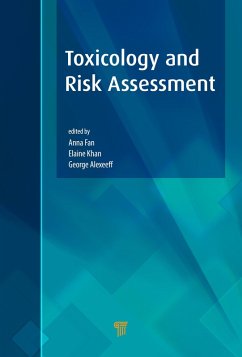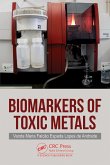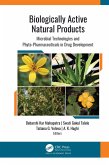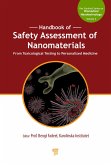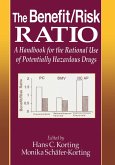Toxicology and Risk Assessment (eBook, PDF)
Redaktion: Fan, Anna M.


Alle Infos zum eBook verschenken

Toxicology and Risk Assessment (eBook, PDF)
Redaktion: Fan, Anna M.
- Format: PDF
- Merkliste
- Auf die Merkliste
- Bewerten Bewerten
- Teilen
- Produkt teilen
- Produkterinnerung
- Produkterinnerung

Hier können Sie sich einloggen

Bitte loggen Sie sich zunächst in Ihr Kundenkonto ein oder registrieren Sie sich bei bücher.de, um das eBook-Abo tolino select nutzen zu können.
The presence of chemicals in our environment is a subject of intense interest owing to the many potential adverse health effects to humans following exposure to these chemicals. The principles and practices of risk assessment are used to assess the associated health risks to provide a scientific and health basis for guidance or regulatory standards development and risk management decision making for public health protection.This book compiles, discusses, and presents cutting-edge research data and methodology in performing risk assessment of some major chemicals of concern in our environment.…mehr
- Geräte: PC
- mit Kopierschutz
- eBook Hilfe
- Größe: 19.08MB
- FamilySharing(5)
![Scalable Green Chemistry (eBook, PDF) Scalable Green Chemistry (eBook, PDF)]() Scalable Green Chemistry (eBook, PDF)99,95 €
Scalable Green Chemistry (eBook, PDF)99,95 €![Biomarkers of Toxic Metals (eBook, PDF) Biomarkers of Toxic Metals (eBook, PDF)]() Vanda Maria Falcão Espada Lopes de AndradeBiomarkers of Toxic Metals (eBook, PDF)59,95 €
Vanda Maria Falcão Espada Lopes de AndradeBiomarkers of Toxic Metals (eBook, PDF)59,95 €![Biologically Active Natural Products (eBook, PDF) Biologically Active Natural Products (eBook, PDF)]() Biologically Active Natural Products (eBook, PDF)119,95 €
Biologically Active Natural Products (eBook, PDF)119,95 €![Polysaccharide Hydrogels (eBook, PDF) Polysaccharide Hydrogels (eBook, PDF)]() Polysaccharide Hydrogels (eBook, PDF)120,95 €
Polysaccharide Hydrogels (eBook, PDF)120,95 €![Handbook of Safety Assessment of Nanomaterials (eBook, PDF) Handbook of Safety Assessment of Nanomaterials (eBook, PDF)]() Handbook of Safety Assessment of Nanomaterials (eBook, PDF)165,95 €
Handbook of Safety Assessment of Nanomaterials (eBook, PDF)165,95 €![Physico-Chemical Properties of Nanomaterials (eBook, PDF) Physico-Chemical Properties of Nanomaterials (eBook, PDF)]() Richard C. PleusPhysico-Chemical Properties of Nanomaterials (eBook, PDF)119,95 €
Richard C. PleusPhysico-Chemical Properties of Nanomaterials (eBook, PDF)119,95 €![The Benefit/Risk Ratio (eBook, PDF) The Benefit/Risk Ratio (eBook, PDF)]() Hans C. KortingThe Benefit/Risk Ratio (eBook, PDF)60,95 €
Hans C. KortingThe Benefit/Risk Ratio (eBook, PDF)60,95 €-
-
-
Dieser Download kann aus rechtlichen Gründen nur mit Rechnungsadresse in A, B, BG, CY, CZ, D, DK, EW, E, FIN, F, GR, HR, H, IRL, I, LT, L, LR, M, NL, PL, P, R, S, SLO, SK ausgeliefert werden.
- Produktdetails
- Verlag: Pan Stanford
- Seitenzahl: 1426
- Erscheinungstermin: 4. März 2015
- Englisch
- ISBN-13: 9789814613392
- Artikelnr.: 42564898
- Verlag: Pan Stanford
- Seitenzahl: 1426
- Erscheinungstermin: 4. März 2015
- Englisch
- ISBN-13: 9789814613392
- Artikelnr.: 42564898
- Herstellerkennzeichnung Die Herstellerinformationen sind derzeit nicht verfügbar.
Contaminants. Dose-Response Assessment: Significance in Risk Assessment.
Recent Advances in Cancer Estimation. Consideration of Infants and Children
in Risk Assessment. Role of Epidemiology in Drinking Water Risk Assessment.
Approaches to Using Structure Activity Relationship (SAR) Analysis with
Mechanistic Considerations to Assess Carcinogenic Hazard/Risk Potential of
Chemical Substances. The Application of PBPK Modeling, Bayesian Approach,
and the Utilization of Markov Chain Monte Carlo Simulation in Risk
Assessment. Risk Assessment of Trichloroethylene. Fumigants: Toxicology and
Development of Acute Reference Concentrations for Methyl Iodide, Methyl
Bromide and Chloropicrin. Cholinesterase Inhibiting Pesticides: Toxicity,
Mechanisms, and Implications for Risk Assessment. Mode of Action Toxicity
Pathways Demonstrate Developmental Male Reproductive Risk from Endosulfan.
Evidence on the Carcinogenicity of Butyl Benzyl Phthalate (BBP) and
Possible Mechanisms of Action. The Cell and Molecular Biology of
Nickel-Induced Cell Transformation and Carcinogenesis. Asbestos.
Nanoparticles and Human Health: Physicochemical Considerations.
Nanomaterials: Feasibility and Challenges for Human Health Risk Assessment.
Nanotechnology: Emerging Research and Implications for Health and Policy.
Emergency Response: Application of Toxicology and Risk Assessment.
Toxicology Application in Drug Development. Application of Toxicology in
Food Safety Assessment. Chemical Toxicity Testing and Risk Assessment
Practice in China. Federal-State Toxicology and Risk Analysis Committee
(FSTRAC): Communication and Coordination of Toxicology and Risk Assessment
of Environmental Contaminants Communication and Coordination of
Toxicological Issues and Risk Analysis Activities Relating to Environmental
Contaminants. Challenges and Opportunities for Older Adults. Occupational
Health and Safety Risks for the Aging Worker. Health Implications of
Chemicals and Pharmaceutics in an Aging Population. Water Consumption Data
for Derivation of Drinking Water Ingestion Rates for Different Age Groups.
Food Consumption Rates for Estimating Exposures to Chemicals in Food. Risk
Assessment and Critical Thinking. Risk Assessment of Chemicals in Drinking
Water: Current Concepts and Methodology, Accomplishments, and Future
Perspectives.
Contaminants. Dose-Response Assessment: Significance in Risk Assessment.
Recent Advances in Cancer Estimation. Consideration of Infants and Children
in Risk Assessment. Role of Epidemiology in Drinking Water Risk Assessment.
Approaches to Using Structure Activity Relationship (SAR) Analysis with
Mechanistic Considerations to Assess Carcinogenic Hazard/Risk Potential of
Chemical Substances. The Application of PBPK Modeling, Bayesian Approach,
and the Utilization of Markov Chain Monte Carlo Simulation in Risk
Assessment. Risk Assessment of Trichloroethylene. Fumigants: Toxicology and
Development of Acute Reference Concentrations for Methyl Iodide, Methyl
Bromide and Chloropicrin. Cholinesterase Inhibiting Pesticides: Toxicity,
Mechanisms, and Implications for Risk Assessment. Mode of Action Toxicity
Pathways Demonstrate Developmental Male Reproductive Risk from Endosulfan.
Evidence on the Carcinogenicity of Butyl Benzyl Phthalate (BBP) and
Possible Mechanisms of Action. The Cell and Molecular Biology of
Nickel-Induced Cell Transformation and Carcinogenesis. Asbestos.
Nanoparticles and Human Health: Physicochemical Considerations.
Nanomaterials: Feasibility and Challenges for Human Health Risk Assessment.
Nanotechnology: Emerging Research and Implications for Health and Policy.
Emergency Response: Application of Toxicology and Risk Assessment.
Toxicology Application in Drug Development. Application of Toxicology in
Food Safety Assessment. Chemical Toxicity Testing and Risk Assessment
Practice in China. Federal-State Toxicology and Risk Analysis Committee
(FSTRAC): Communication and Coordination of Toxicology and Risk Assessment
of Environmental Contaminants Communication and Coordination of
Toxicological Issues and Risk Analysis Activities Relating to Environmental
Contaminants. Challenges and Opportunities for Older Adults. Occupational
Health and Safety Risks for the Aging Worker. Health Implications of
Chemicals and Pharmaceutics in an Aging Population. Water Consumption Data
for Derivation of Drinking Water Ingestion Rates for Different Age Groups.
Food Consumption Rates for Estimating Exposures to Chemicals in Food. Risk
Assessment and Critical Thinking. Risk Assessment of Chemicals in Drinking
Water: Current Concepts and Methodology, Accomplishments, and Future
Perspectives.
